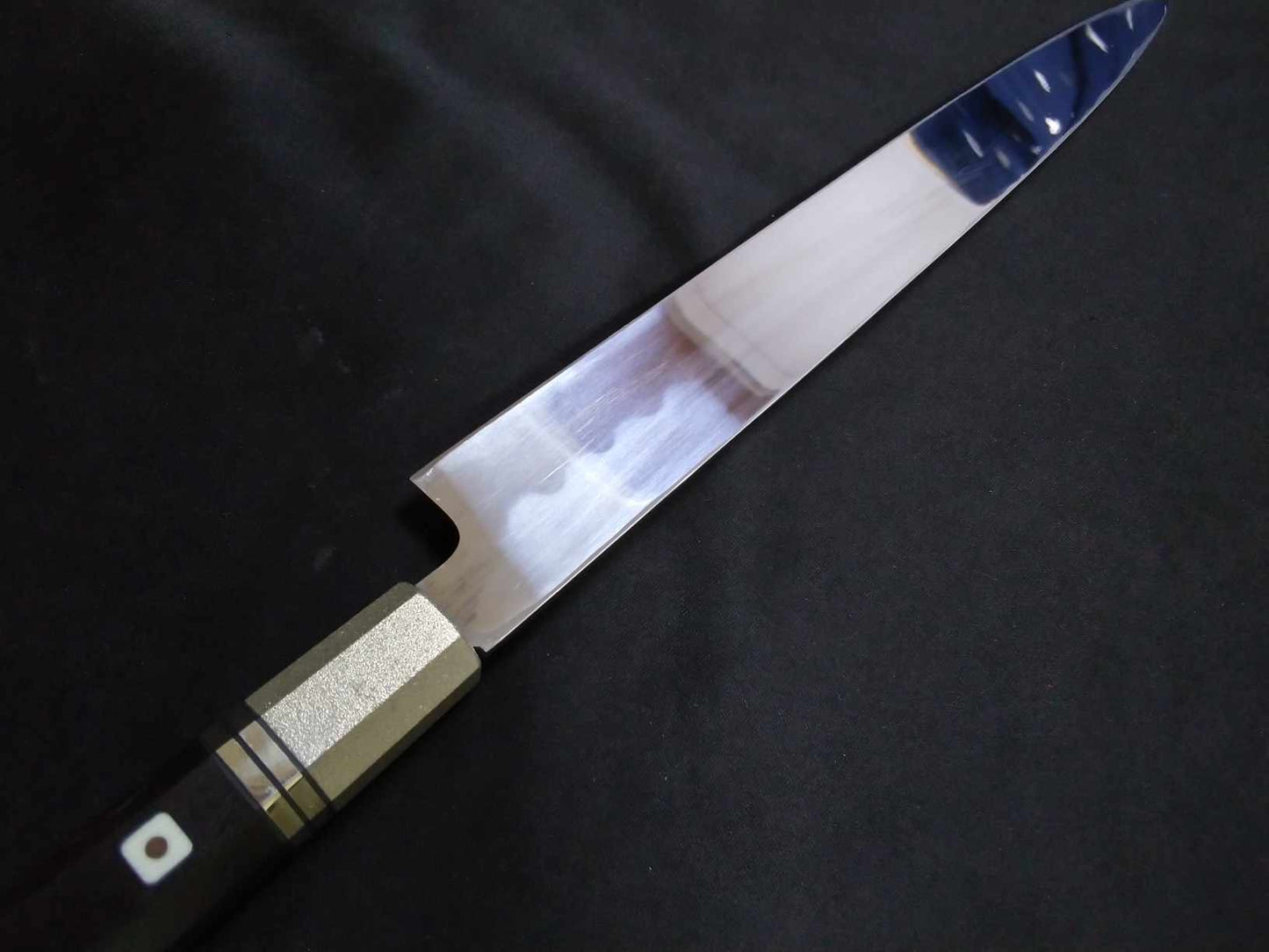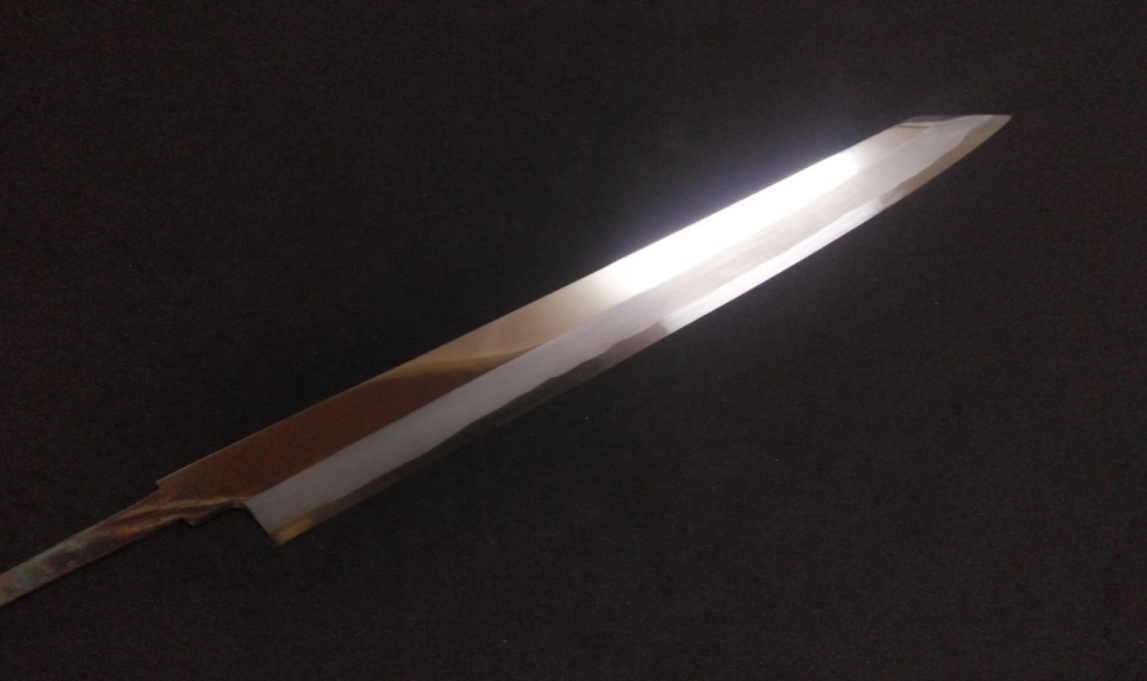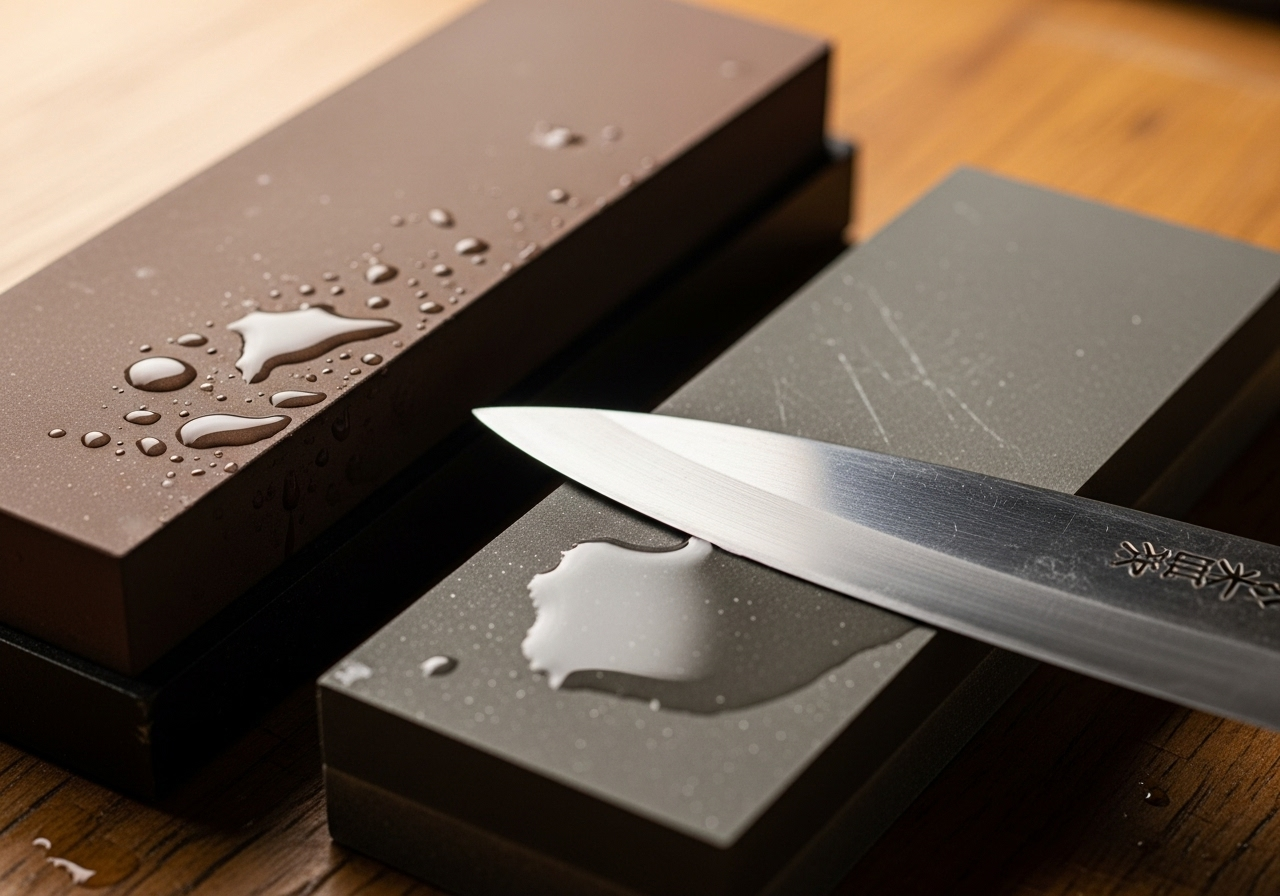KIREAJI
White Steel #2 (Honyaki-Aburayaki) Yanagiba 300mm-Mirror Polished(both sides)
White Steel #2 (Honyaki-Aburayaki) Yanagiba 300mm-Mirror Polished(both sides)
Out of stock
This Japanese knife is a rare, one-time offer. Once sold out, it will not be available again.
Shipping is free to the United States and Canada.
Couldn't load pickup availability
<Type>
Yanagiba
-Single-edged: right-handed
-Mirror Polished: both sides
<Material>
- Blade : White Steel #2
- Handle:Ebony
<Size & Weight>
-Handle to tip length: 310㎜
-Blade height: 36㎜
-Thickness: 4.0㎜
-Weight: 347g
<Brand name>
Shiroyama (made in Sakai, Osaka)
Shipping & Returns
Shipping & Returns
Shipping is free to the United States and Canada.
After receiving an order from the customer, the craftsmen in Sakai City attach a handle to the Japanese knife and, if requested, perform Honbazuke as well. Therefore, it takes approximately 2 to 4 weeks to deliver the product.
Please refer to our return policy.



Traditional craftsmen working on this product


KIREAJI's Three Promises to You
-

1. Forged in the Legacy of Sakai
From Sakai City—Japan’s renowned birthplace of professional kitchen knives—each blade is crafted by master artisans with over six centuries of tradition. Perfectly balanced, enduringly sharp, and exquisitely finished, every cut carries the soul of true craftsmanship.
-

2. Thoughtful Care for Everyday Use
Every knife includes a hand-fitted magnolia saya for safe storage. Upon request, we offer a complimentary Honbazuke final hand sharpening—giving you a precise, ready-to-use edge from day one.
-

3. A Partnership for a Lifetime
A KIREAJI knife is more than a tool—it is a lifelong companion. With our bespoke paid aftercare services, we preserve its edge and beauty, ensuring it remains as precise and dependable as the day it first met your hand.

Why Many Product Photos Show Only the Blade
At KIREAJI, every knife is made to order in Sakai, Japan. Photos show the blade before the handle is attached, allowing artisans to perfect the balance and edge for your specific order. Your knife arrives fully finished — tailored just for you.

Global Delivery from Sakai
Across the world, discerning cooks seek authentic Japanese knives from Sakai — Japan’s legendary knife-making city with over 600 years of tradition.
At KIREAJI, we work alongside master artisans in Sakai to fulfill that desire, shipping genuine handcrafted knives directly from the workshop to kitchens worldwide.
-
Precautions
-
1. Honbazuke (Initial Sharpening)
If you wish to request Honbazuke, please select “Yes” when ordering. (Free of charge)
At KIREAJI, we provide the Honbazuke service free of charge upon request.
Please note that this is a practical initial sharpening.
As the knives are shipped internationally, the blade must be protected during transit.
You can make the final adjustments yourself to suit your personal preferences.
2. Handcrafted Nature
Each piece is handcrafted by skilled artisans and therefore unique.
Minor scratches or marks may be visible due to the handmade production process; however, these do not affect performance or functionality.
We kindly ask for your understanding in advance.
3. Natural Materials
As buffalo horn is a natural material, color variations may occur, and the actual product may differ slightly from the photo.
4. Measurements
Please consider the listed weight and length as approximate values.
5. Inventory
We carefully manage our stock, but in the rare case an item is out of stock, we will notify you by email.
If you have any questions, please feel free to contact us. (Estimated reply time: within 10 hours)
Why Is Honyaki So Special?

Before Using a Knife
A knife is more than a tool—it’s the heart of cooking. Learning how to use it properly helps protect its quality, durability, and safety, so you can enjoy it for years while elevating every meal.

Daily Care of a Japanese Knife
With the right daily care, your knife will stay sharp and reliable for a long time. Here, we share the key points to keep it in peak condition and extend its lifespan.

After-Sales Service
At KIREAJI, we ensure your knife can be cherished for years with our dedicated after-sales service, provided by the Shiroyama Knife Workshop. For repairs or maintenance, please apply through the link below.
Why Every Great Chef Swears by a Good Knife
-
A great knife is more than a kitchen tool—it’s the secret to unlocking your full potential as a cook. From preserving the true flavor of your ingredients to making every cut effortless, the right knife transforms not only your dishes but also the way you feel in the kitchen. In this video, discover why chefs around the world swear by high-quality knives—and how choosing the right one can elevate your cooking to a whole new level.
-






